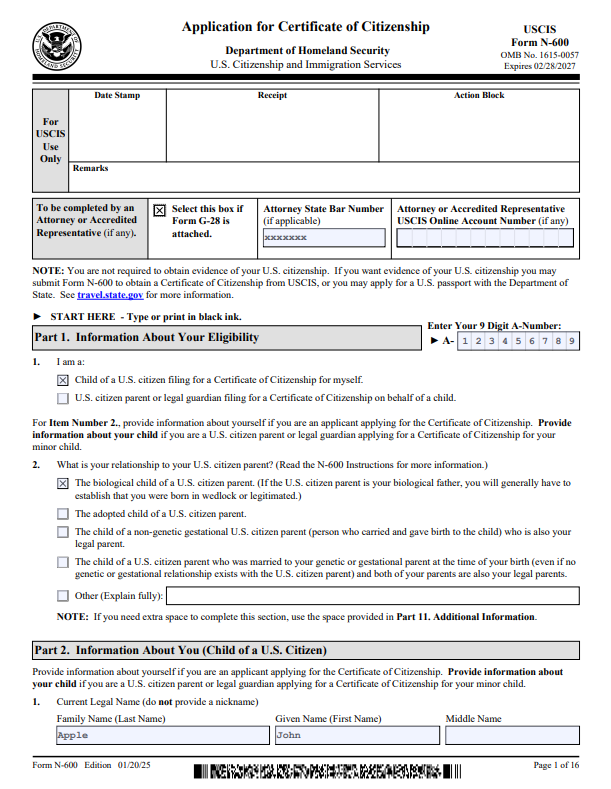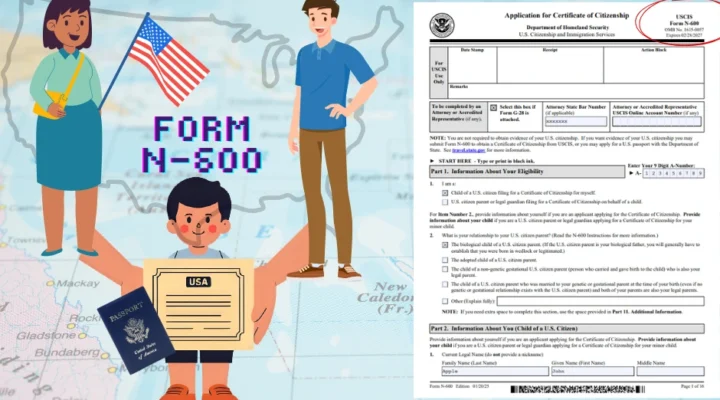A Certificate of Citizenship is how individuals born outside of the United States to citizen parent(s) can prove U.S. citizenship. This certificate is important because it can be used as proof of citizenship to obtain a U.S. passport and other immigration services for a spouse or relative down the line. Form N-600, Application for Certificate of Citizenship, can be filed online or on paper to acquire the certificate. Follow this ultimate guide for instructions, N-600 processing times, fee waiver, and more.
Who Should File an N-600?
Those who have already obtained U.S. citizenship but need their certificate of citizenship should file for an N-600. The N-600 form proves that an individual is already a U.S. citizen.
N-600 Eligibility Requirements:
- You were born outside the U.S. to U.S. citizen parents.
- You became a lawful permanent resident and automatically obtained citizenship through your parents after birth.
- You are under 18 years old, and your U.S. citizen parent is filing the form on your behalf.
- You need official proof of citizenship for a passport, employment, or other legal matter.
Acquisition vs. Derivation
You may see the terms acquisition and derivation used when exploring the Certificate of Citizenship process.
- Acquisition is used to describe a person born outside the U.S. to a citizen parent.
- Derivation describes a person who has obtained citizenship with parents who are green card holders.
Stepchildren cannot acquire U.S. citizenship unless they are adopted.
N-600 Form Instructions
Form N-600 can be filed online with a USCIS account or by mailing the completed document.
It is recommended to file online because you can easily check the status of your application and receive updates online!

Step 1: Decide How to File
To file online, access USCIS online services, and log in with your USCIS account.
If you would like to file Form N-600 by paper, you can download the application. Once you have completed and signed all the questions (in black ink), attach supporting evidence, and mail it to the specified USCIS address, which varies depending on your current address.
Step 2: Fill out the Form Sections
Section 1: Information About Your Eligibility
The first section of the application asks whether you are a biological child of a U.S. citizen parent, adopted child of a U.S. citizen parent, child of a surrogate, or "Other," fully explaining your eligibility.
Section 2: Information About You
Section 2 should be filled out about you or, if you are applying for a minor, about your child.
- Personal details, USCIS/Social Security numbers, admission documents
- Indicate the type of travel document you used to be admitted into the country
- Lawful Permanent Resident, Nonimmigrant, refugee/asylee, or other. If you obtained Lawful Permanent Resident status via an adjustment of status, indicate the date this happened and the location in Question 15D.
- If you previously applied for a Certificate of Citizenship or U.S. passport, you need to explain in the space provided.
- Include adoption information if applicable.
- Biographic information (Ethnicity, race, height, weight, eye color, and hair color)
Section 3: Information About Your U.S. Citizen Biological Mother or Father
Complete Section 3 if you are claiming citizenship through your biological U.S. citizen parents. Should you be a U.S. citizen father applying on behalf of your child, then answer the questions about yourself regarding name, date of birth, country of birth, citizenship/nationality, physical address, and marital history.
Section 4: Information about your other Mother or Father
Complete Section 4 if you are claiming citizenship through your adopted U.S. citizen parents. If you are a U.S. citizen mother applying on behalf of your child, then answer the questions about yourself regarding name, date of birth, country of birth, citizenship/nationality, physical address, and marital history.
Section 5: Information about the legal guardian applying on behalf of the child
Complete Section 5 only if a legal guardian (not a biological parent) is filing Form N-600 for a minor child.
Section 6: Physical Presence in the United States From Birth Until Filing of Form N-600
Section 6 asks about specific dates your U.S. citizen parent(s) were physically present in the United States since they were born up until your birth. This only applies to applicants born outside the U.S. who are claiming to be U.S. citizens.
Section 7: Information About Military Service of U.S. Citizen Parents
If this applies to your case, you need to write the dates of military service your mother or father had and the type of discharge, whether honorable, dishonorable, or other than honorable.
Section 8: Applicant's Statement, Contact Information, Certification, and Signature
The section asks you to certify that you can read and understand English (or have an interpreter you will name in Section 9 to answer the questions). Sign and certify that the documents you provide as evidence are unaltered, exact photocopies or originals, and that you authorize the release of this form information to immigration enforcement agencies when necessary.
Section 9: Interpreter's Contact Information, Certification, and Signature
If an interpreter aided in completing Form N-600, list their full name, mailing address, and contact information in Section 9. They will also need to certify under penalty of perjury that they are fluent in English and the applicant's native language.
Section 10: Contact Information, Declaration, and Signature of the Person Preparing this Application, if Other than the Applicant
If you used a preparer (like a lawyer or accredited representative) to complete the Certificate of Citizenship form, list their full name, mailing address, and contact information. In addition, they will all need to certify and sign that they prepared the application at the applicant's request.
Section 11: Additional Information
This space is provided to elaborate on answers to previous questions.
Section 12: Affidavit
Do not complete this section unless you have been instructed to during your interview. Not all applicants will be required to have an interview with USCIS. The decision for an affidavit is made on a case-by-case basis according to the information in your application and supporting documents. For reasons including this one, it is always advised to have an immigration professional prepare and review your immigration documents to ensure the best case for approval of your certificate requests.
Section 13: Officer Report and Recommendation on Application for Certificate of Citizenship (USCIS USE ONLY)
The USCIS officer will complete this section based on the documents, records, and testimony you provide. Therefore, do not write anything in this area.
N-600 Processing Time
The N-600 processing time in 2025 is 3 months, according to USCIS data. However, actual processing times may vary depending on the service center handling your case and the completeness and accuracy of your application.
N-600 Costs
The filing fee for Form N-600 is $1,385 (paper) and $1,335 (online).
N-600 Documents
You must submit the following supporting documents to file Form N-600:
- Photographs: Attend an appointment at an ASC to take photos (in the U.S.) or take two identical passport-style photos 2×2 (Outside the U.S)
- Birth certificate or record issued and certified by a civil authority in your birth country
- Birth Certificate of U.S. Citizen Parent
- Parents’ marriage certificate
- Proof of parent(s) United States citizenship (i.e., birth certificates, Certificate of Naturalization, Certificate of Citizenship, valid unexpired U.S. passport, etc.)
If applicable, please also submit:
- Proof of your U.S. citizenship (i.e., Consular report of birth abroad, valid U.S. passport)
- Proof of status as a U.S. national/lawful permanent resident
- Your marriage certificate
- Proof of legitimacy (If born out of wedlock)
- Parents’ marriage termination documents
- Evidence of citizen parents’ physical presence in the U.S. (i.e., school records, employment records, mortgages, deeds, etc.)
- For individuals with divorced or separated parents, evidence of legal custody
- Adoption decrees, if applicable
- Proof of legal name change
If you file online, you can upload these documents through your USCIS online account, but your evidence will need to be included in the printed package if you decide to mail your application.
Documents to Demonstrate Proof of Citizenship
If you were born or adopted by a U.S. citizen parent(s), then you are, by law, eligible for U.S. citizenship before age 18. Other documents that serve as proof of your U.S. citizenship include:
- Birth certificate indicating birth in the U.S.
- Form N-550, Certificate of Naturalization
- Form N-560, Certificate of Citizenship
- Form FS-240, Report of Birth Abroad of U.S Citizen
- Valid unexpired U.S. passport
Under Section 320 of the Immigration and Nationality Act (INA), a child born outside of the United States is automatically a U.S. citizen if all the following conditions are met (on or after Feb. 27, 2001):
- At least one parent (adoptive parents count) is a U.S. citizen through birth or naturalization
- The child is under the age of 18
- The child is living in the U.S. legally, in the custody of the U.S. parent
- The child is a lawful permanent resident
If these conditions are met, and you need to prove your citizenship, you should apply for a Certificate of Citizenship or an N-600 for a child.
Apply for citizenship today! Reach out to us for free.
Who Should Not Use Form N-600?
You should not use Form N-600 if:
- Born in the U.S.: Your birth certificate serves as your citizenship proof.
- Naturalized U.S. citizen: Your Certificate of Naturalization serves as your proof.
- Currently living abroad: If you are currently abroad, you should try to obtain proof of citizenship through a passport application at a U.S. embassy.
- Neither parent is a U.S. citizen
N-600 Frequently Asked Questions
How do I obtain a replacement Certificate of Citizenship?
You can receive a replacement Certificate of Citizenship or Naturalization by filing Form N-565, Application for Replacement Naturalization/Citizenship Document.
Is there an N-600 Fee Waiver?
You will need to file Form I-912 to apply for the fee waiver. To qualify for an N-600 fee waiver, you must demonstrate one of the following conditions:
- You or your spouse is the head of household and currently receiving a means-tested benefit (i.e., Supplemental Nutrition Assistance Program, Medicaid, housing benefits, employment allowance, Supplemental Security Income, etc.)
- Your household income is at or below 150% of the Federal Poverty Guidelines at the time of filing.
- You are facing a proven financial hardship, such as unexpected medical expenses.
Since USCIS filing fees sometimes change, you should always check the USCIS website for the correct amount before making out your check.
How can I pay the N-600 filing fee?
Instructions to pay the filing fee according to USCIS:
Your check or money order must be drawn on a bank or other financial institution located in the United States and must be payable in U.S. currency. Make the check or money order payable to U.S. Department of Homeland Security. NOTE: Spell out U.S. Department of Homeland Security; do not use the initials “USDHS” or “DHS.” If you live outside the United States, contact the nearest U.S. Embassy or U.S. Consulate for instructions on the method of payment.
Failure to pay the appropriate N-600 fee will result in a rejection. If you feel you can not afford the fee and have a legitimate financial hardship, apply for an N-600 fee waiver using Form I-912.
What is the difference between N-400 and N-600?
Form N-600 is designed for U.S. citizens who do not have evidence of their citizenship to obtain a citizenship certificate. Form N-400 is for green card holders to apply to become a naturalized U.S. citizen.
So if one or both of your parents is a U.S. citizen or went through the naturalization process before you turned 18 years old, you are likely already a U.S. citizen and should use Form N-600 if you need proof of citizenship and do not have a birth certificate. However, if you have already become a naturalized citizen, your Certificate of Naturalization serves as your evidence, and you should not file Form N-400.
How long does it take to get an N-600 approved?
It is currently taking around 3 months for an N-600 to get approved.
Does N-600 require an interview?
This requirement is determined on a case-by-case basis, so not all applicants will be required to have an in-person interview with USCIS. In some instances, USCIS may also require you to provide fingerprints, photos, or signatures to verify your identity.
Does my child need N-600?
If your child was born in the United States, they automatically have U.S. citizenship, and their birth certificate serves as proof of their citizenship. However, if your child was born abroad to a U.S. citizen mother or father (or green card holder parents), then the legal guardian can file Form N-600 to acquire proof of the child's U.S. citizenship. The same goes for an adoptive parent who is a U.S. citizen.
Can I get a Certificate of Citizenship if my U.S. citizen parent is dead?
Yes, in most cases, a deceased U.S. parent will not affect your ability to apply for a Certificate of Citizenship if you were eligible for citizenship based on birth, or before your parent's death. However, if you were not eligible for citizenship before your citizen parent died, that would affect your ability to get the certificate unless you can qualify based on Section 322 of the Immigration and Nationality Act requirements.
Why would an N-600 be denied?
An N-600 can be denied if USCIS determines that the application is incomplete or lacks sufficient proof. For example, if the U.S. citizen parent did not meet the physical presence requirements before the child's birth abroad, then the application could be denied.
Is N-600 necessary for a passport?
No, Form N-600 is not required to get a U.S. passport.
Can I file N-400 and N-600 together?
No, you cannot file N-400 and N-600 together. These forms serve two different purposes, where the N-400 applies to individuals who are not U.S. citizens, and the N-600 applies to individuals who are already U.S. citizens by law.
How can I check the status of my N-600?
After USCIS notifies you that they have received your application, you will be given a 13-digit receipt number. Use this receipt number on the USCIS Case Status Tool to check the processing updates. If you filed online using your USCIS account, you could also check there for status updates.









